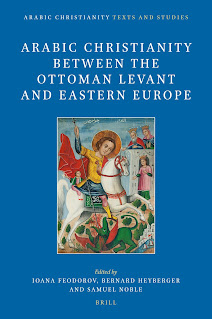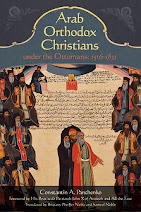Arabic original here .
The Hoped-for Unity
Frankness requires us to admit that the great roadblock that prevents us from reaching the envisioned unity between the Catholic and Orthodox Churches is the difference over the position of the pope, the Bishop of Rome, and his authority in the Church. In reality, no one who knows Church history can ignore the most important issue that led to the schism, the disagreement between East and West over "papal primacy". Orthodox theology confirms that, among the bishops, the pope is "first among equals" and has no canonical authority over the other patriarchs.
However, in the West a canonical understanding graduate took over that is completely contrary to the Orthodox view of primacy, in that the pope granted himself the absolute authority to appoint and remove bishops in every region of the world. The bishops rights turned into mere participation in the "total authority" of Rome. Hence the Orthodox apprehension of the pope's propensity for asserting his authority over all the churches. What we witnessed following the Great Schism of 1054 with regard to the pope tightening his grip over all the churches in the world to the point of even announcing the dogma of "papal infallibility" in 1870 confirms the fears of the eastern churches that hold to the primacy of the diocesan bishop over his local church.
The Orthodox theologian Olivier Clément, in his book You Are Peter: An Orthodox Reflection on the Exercise of Papal Primacy argues that "the basis of every primacy in the Church is Christ alone, the Crucified and Risen from the dead, who conquers death by death. Christ alone is priest of the new and greatest covenant. All authority on heaven and earth derives from Him." Consequently, "every primacy in redeemed humanity, and especially the primacy of the bishop in the local church, the primacy of the metropolitan among his bishops, the patriarch among his metropolitans, and finally the primacy of the first bishop, the bishop of Rome, is only a fragile image of the primacy that Fr Lev Gillet called loving lordship, the primacy of service unto martyrdom, a martyrdom of blood and death if needs be."
Perhaps the declaration by the late Pope John Paul II that what he desires with the Orthodox is "communion not authority" is the true doorway to bringing back unity between the two churches. Thus it is possible to speak of a return to the traditional picture of relations between the churches, based on the independence of the local church, in which each one of them realizes the fullness of the Church and communio in sacris (the Eucharist) between all of them is what makes them one, what makes them the one Body of Christ.
We also must not forget that the Christian faith is fundamentally based on belief in the Holy Trinity: Father, Son, and Holy Spirit, one God. Thus the theology of the Church emphasizes "diversity in unity" and "unity in diversity" in order to point out the relationship between the three hypostases. Unity does not eliminate the specificity that characterizes each of the Father, Son, and Holy Spirit. Likewise, diversity does not mean individualism, isolation, or the absence of creative relationality. Unity among Christians must be based on this Trinitarian image. The hoped-for unity is a unity in faith that respects linguistic, ritual, cultural, and civilizational particularities.
The disagreement between Catholics and Orthodox about the place of the pope in the universal Church must not impede effort to resolve other disagreements of a doctrinal nature or disagreements that can be overcome at the local level... for the unity of all we pray to the Lord.
The Hoped-for Unity
Frankness requires us to admit that the great roadblock that prevents us from reaching the envisioned unity between the Catholic and Orthodox Churches is the difference over the position of the pope, the Bishop of Rome, and his authority in the Church. In reality, no one who knows Church history can ignore the most important issue that led to the schism, the disagreement between East and West over "papal primacy". Orthodox theology confirms that, among the bishops, the pope is "first among equals" and has no canonical authority over the other patriarchs.
However, in the West a canonical understanding graduate took over that is completely contrary to the Orthodox view of primacy, in that the pope granted himself the absolute authority to appoint and remove bishops in every region of the world. The bishops rights turned into mere participation in the "total authority" of Rome. Hence the Orthodox apprehension of the pope's propensity for asserting his authority over all the churches. What we witnessed following the Great Schism of 1054 with regard to the pope tightening his grip over all the churches in the world to the point of even announcing the dogma of "papal infallibility" in 1870 confirms the fears of the eastern churches that hold to the primacy of the diocesan bishop over his local church.
The Orthodox theologian Olivier Clément, in his book You Are Peter: An Orthodox Reflection on the Exercise of Papal Primacy argues that "the basis of every primacy in the Church is Christ alone, the Crucified and Risen from the dead, who conquers death by death. Christ alone is priest of the new and greatest covenant. All authority on heaven and earth derives from Him." Consequently, "every primacy in redeemed humanity, and especially the primacy of the bishop in the local church, the primacy of the metropolitan among his bishops, the patriarch among his metropolitans, and finally the primacy of the first bishop, the bishop of Rome, is only a fragile image of the primacy that Fr Lev Gillet called loving lordship, the primacy of service unto martyrdom, a martyrdom of blood and death if needs be."
Perhaps the declaration by the late Pope John Paul II that what he desires with the Orthodox is "communion not authority" is the true doorway to bringing back unity between the two churches. Thus it is possible to speak of a return to the traditional picture of relations between the churches, based on the independence of the local church, in which each one of them realizes the fullness of the Church and communio in sacris (the Eucharist) between all of them is what makes them one, what makes them the one Body of Christ.
We also must not forget that the Christian faith is fundamentally based on belief in the Holy Trinity: Father, Son, and Holy Spirit, one God. Thus the theology of the Church emphasizes "diversity in unity" and "unity in diversity" in order to point out the relationship between the three hypostases. Unity does not eliminate the specificity that characterizes each of the Father, Son, and Holy Spirit. Likewise, diversity does not mean individualism, isolation, or the absence of creative relationality. Unity among Christians must be based on this Trinitarian image. The hoped-for unity is a unity in faith that respects linguistic, ritual, cultural, and civilizational particularities.
The disagreement between Catholics and Orthodox about the place of the pope in the universal Church must not impede effort to resolve other disagreements of a doctrinal nature or disagreements that can be overcome at the local level... for the unity of all we pray to the Lord.







